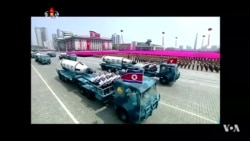As the tense nuclear standoff between North Korea and the United States continues to escalate, the risk of military conflict grows, while hopes for a peaceful solution remain remote.
On Sunday U.S. Secretary of State Rex Tillerson said diplomatic efforts to persuade the Kim Jong Un government to give up its nuclear and long range ballistic missile program will continue “until the first bomb drops.”
But President Donald Trump has been pessimistic on the prospect of finding any diplomatic solution. He has called Tillerson’s efforts a “waste of time” and indicated that North Korean leader Kim Jong Un cannot be trusted to adhere to any diplomatic agreement as the leadership in Pyongyang has repeatedly violated past denuclearization deals.
"I think I might have a somewhat different attitude, and a different way than other people. I think perhaps I feel stronger and tougher on that subject, than other people," Trump said last week.
Systematic preparations
The Trump administration’s hardline stance demanding North Korea unilaterally stop developing a nuclear-armed intercontinental ballistic missile that could reach the U.S. mainland could be a negotiating strategy, but critics fear it could also be laying the groundwork for the eventual use of military force.
“This administration not just Trump, this administration is systematically preparing for a time not that far off in the future, basically next year the way I interpreted it in context, when diplomacy has failed,” said John Delury, an international relations professor at Yonsei University in Seoul.
A recent poll shows increasing U.S. support among President Donald Trump’s Republican supporters for a preemptive strike to take out North Korean nuclear or ballistic missile sites, although a strong majority of Americans still oppose the use of force.
While launching such a strike to prevent an imminent North Korean attack on the U.S. would be a justifiable use of force, it might be difficult to prove.
But any first strike military options, including possible cyberattacks to sabotage North Korean missile tests, or a decapitation strike to kill Kim Jong Un and the leadership in Pyongyang, would risk deadly retaliation against South Korea along with the 28,000 American troops stationed in the south, and could plunge the entire region into a nuclear war.
“I think that would be morally, diplomatically, strategically, politically a great disaster, not only for the people of Korea and the region, but for the United States of America too,” said North Korea analyst David Straub with the Sejong Institute.
Military brinksmanship
Yet neither side is acting to reduce tensions, as they remain locked in what seems a deadly game of brinksmanship.
The United States and South Korea began week-long joint Navy drills in the waters around the Korean peninsula that involve about 40 naval ships from both countries, including the nuclear-powered USS Ronald Reagan aircraft carrier and U.S. submarine Michigan.
South Korean media is reporting that a U.S. Special Forces unit practicing for "decapitation" operations is taking part in the joint exercises.
The U.S. has also sent a B-1B Lancer strategic bomber and F-22 Raptor stealth fighter jets to participate in the Seoul air show this week.
And the U.S. forces in Korea will begin non-combatant evacuation training next week for service members and their families in case of a North Korean attack or other disaster.
North Korea in turn is expected to test another long-range missile soon. The North’s state news agency KCNA on Friday indicated a missile test might target waters near the U.S. territory of Guam." In August, Trump said the U.S. would respond “with fire and fury” to an earlier North Korean threat to target Guam.
Pyongyang says the Trump administration’s hostile intent, and the increased military buildup, further justify its need for a nuclear deterrent.







